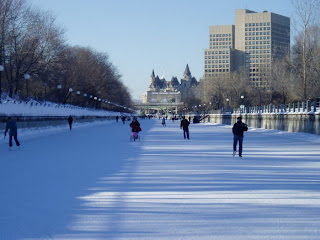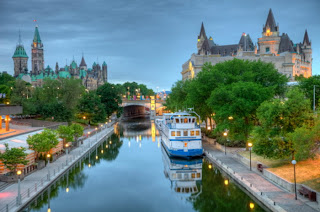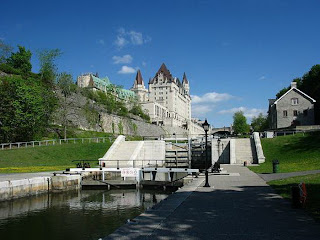Tourist spot of Ottawa and travel news
Ottawa, the capital of the country, arouses in all Canadians
the mixed emotions worth of a nation’s capital. It sits attractively on the
south bank of the Ottawa River at
its confluence with to Rideau River. The gently rolling Gatineau Hills of
Quebec are visible to the north. The government is the largest employer, and the stately
Gothic-style Parliament Buildings act as landmarks. Despite this, the city is
now known as Silicon Valley North for its skilled computer, technology and
telecommunications workforce.
The city attracts five million tourists a year, many to see
just what the heck the capital is like. The abundance of museums and cultural activities is another enticement. And then, of
course, in summer you can see the traditionally garbed Royal Canadian Mounted Police (RCMP), also known as the Mounties.
You may be surprised by the amount of French you hear around
town. Quebec is just a stone’s throw
away, but probably just as important is the fact that most federal government
workers are required to be bilingual.
Ottawa is not an exciting city but its streets, if not
lively, are wide and clean; the air is not fouled by heavy industry. Everywhere
people are fogging and cycling.
Hull (in Quebec), easily reached
across the river, is smaller but is noted for its good restaurants and later
nightlife.
Ottawa History
In 1826
British troops founded the first settlement in order to build the Rideau Canal (linking
the Ottawa River to Lake Ontario). First called Bytown, the name was changed in
1855, and Queen Victoria made it the capital in 1857. After WWII, the Paris
city planner Jacques Greber was put in charge of plans to beautify Ottawa.
Ottawa Info
Tourist Offices the new, efficient tourist office called Capital Infocentre,
is at 90 Wellington St, opposite the parliament Buildings. It’s open every day
form 8.30 am to 9 pm from mid-May to the beginning of September and 9 am to 5
pm the rest of the year. There’s parking in the World Exchange Plaza, one block
south at 111 Albert St.
Hull has its
own information office, on Rue Laurent on the corner of Boulevard St Laurent,
near the Alexandra Bridge. There’s another in City Hall, in downtown Hull. If
you do not travel Ottawa you cannot
understand its importance.
The museums and attractions
of Ottawa are often is a state of flux and are frequently closed, either
being renovated, repaired, upgraded or moved, if there is something you really
wish to see, it’s a god idea to call first to find out its current status. Also
note that admission at many of them is free one day or evening of the week.
Money Several banks can be found
along Sparks St. Accu-Rate Foreign Exchange in Albert St, has longer hours and
sells travelers cheques. It’s open
Saturday.
Post &
Communications
There is a post office at 59 Sparks St.
Foreign
Consulates see
the Facts for the Visitor chapter for listings.
Travel Agencies travel has a branch at Carleton University, south of the
canal along Bronson Avenue. Here you can get the information about Ottawa tourism.
Bookshops &
Maps the World
of Maps and Travel Books, 118 Holland Ave at Wellington St, has an excellent
selection of maps (including topographical ones) and guidebooks. Books Canada
at 71 Sparks St has a good Canadiana section. Chapters at 47 Rideau St are a
good general store which is open every day.
Medical
Services
Ottawa General Hospital is at 501 Smyth Rd.
Dangers & Annoyances Nearly all day and night, the
market area of Ottawa is busy. Late at night, however, it does get a bit of an
edge to it, with some drug and prostitution traffic. Walking alone in the
quieter areas in the wee hours should probably be avoided.
I think you have got the primary idea of Ottawa. However do not forget
to visit Ottawa. Enjoy your traveling.












No comments:
Post a Comment
You can use some HTML tags, such as bold, italic and "nofollow" link in your comments. Thank you.